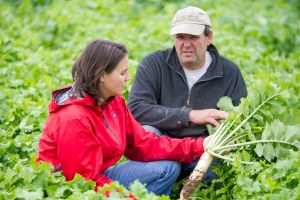Regenerative agriculture can help our food and agricultural systems become more resilient.
Farmers and ranchers are facing escalating challenges from climate change as they confront the consistent need to maintain high levels of productivity. Modern farming practices have enabled farmers to increase per acre production substantially over the last several decades, but these practices can also contribute to the depletion of the quantity and quality of natural resources (such as soil and water). There is a potential solution: regenerative agriculture.
Regenerative agriculture is an emerging approach to farming that aims to increase farm resiliency by improving soil health, restoring natural resources, and increasing biodiversity through integrated farming practices. It can play a key role in helping farmers develop more resilient production systems and mitigate the challenges they face, all while contributing to the goals of companies supporting these practices, including goals of achieving carbon neutrality and sustainable supply chains. Regenerative agriculture does, however, face barriers that impede its adoption, namely financial concerns, access to necessary materials, equipment, and infrastructure, knowledge and education, time, and land tenure. Through public and private programs aimed at supporting farmers' adoption of regenerative agricultural practices, it is possible to reduce barriers to implementation and build farmer capacities, ultimately championing a regenerative future for agriculture.








